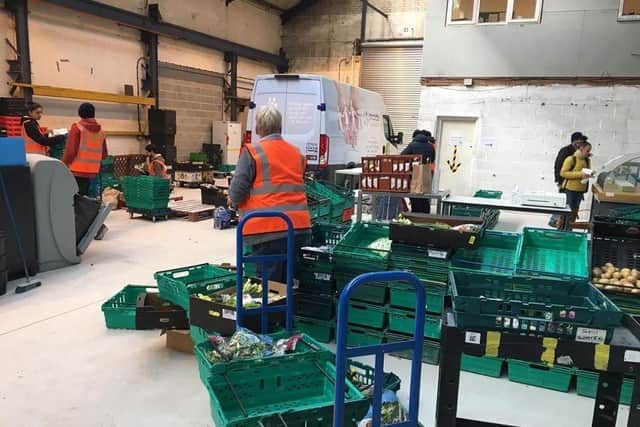Are supermarkets really charitable in this crisis? - Bird Lovegod
I drove to their Wybourn food hub, not really knowing what to expect.
I discover it’s a warehouse of food collected from supermarkets, who otherwise would have thrown it away, indeed, would have paid to throw it away. Mostly fresh, some frozen, veg, meat, fruit, bread, short shelf-life items. And literally tonnes of fruit that would have been for the NHS school fruit and vegetable scheme, but the schools are closed so the distribution companies donated it instead, after being requested to by the Government.
Advertisement
Hide AdAdvertisement
Hide AdCustomers at Food Works, and anyone can be a customer, collect a surplus box of groceries, a free copy of The Yorkshire Post newspaper if they want one, and pay £1 plus whatever donation they can afford.


Food Works also have a subscription service of cooked and frozen prepared meals, which are distributed from a network of eight local hubs in Sheffield, again for just £1 plus.
As a service it’s fantastic, they started five years ago as an environmental initiative but clearly since Covid and lockdown the benefits have extended and demand has boomed.
Yet part of me feels annoyed. On one hand, heroic organisation and truly generous volunteers giving everything they can in effort, time and resources.
Advertisement
Hide AdAdvertisement
Hide AdOn the other hand, with these collections of surplus food, the supermarkets are getting a service for free that they would otherwise have to pay for. They’re not really giving anything. No matter which way you look at it, they are continuously benefiting from this pandemic.
It’s as if a charity shop came to your house and collected your unwanted items. You feel good about giving, but really, you’re giving what you didn’t want to keep, and might even have to pay to dispose of. It’s hardly a sacrifice.
For the supermarkets it’s crumbs from their table, and heroic organisations like Food Works make fantastic use of it.
But seeing the commercial aspect of it, how Food Works actually saves supermarkets money, it almost feels exploitative by the supermarkets, rather than generous.
Advertisement
Hide AdAdvertisement
Hide AdIf they were generous they would pay Food Works for collecting the food. It’s saving them money, yet they don’t even pass those savings on.
It might seem like a win win, but the power imbalance is massive, it’s closer to exploitative than collaborative, and Food Works probably don’t want to rock the boat by asking for payment in case the service is withdrawn from them and their customers suffer.
In a better society, it would be illegal for supermarkets to throw away food. It’s been that way in France for several years.
It is a moral and ethical crime to throw tonnes of food away when there are people in food poverty just minutes away.
Advertisement
Hide AdAdvertisement
Hide AdAnd yet supermarkets happily do this, perhaps it’s a bit too much hassle to do otherwise. And anyway, where’s the profit for them, feeding people in need?
You have to wonder, what kind of business throws away tonnes of food knowing that it could be given to poor people instead? Their adverts show a caring face, their actions speak closer to truth.
They are so huge and powerful that their smallest kindness becomes meals for thousands of people. Imagine if they had even a fraction of the heart of Food Works.
For the supermarkets, they shouldn’t be feeling overly altruistic about giving their unsold stock away rather than paying for it to be landfilled.
Advertisement
Hide AdAdvertisement
Hide AdIt is literally the least they can do. They should be asking themselves how they can do more. And paying Food Works for the service they provide them, for free, would be a very good place to start.
Still we hunger for the right thing to be done. T’was ever thus.
Comment Guidelines
National World encourages reader discussion on our stories. User feedback, insights and back-and-forth exchanges add a rich layer of context to reporting. Please review our Community Guidelines before commenting.